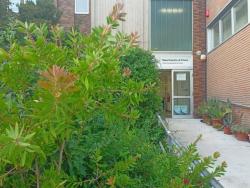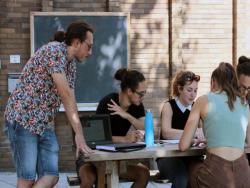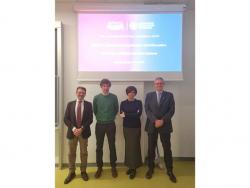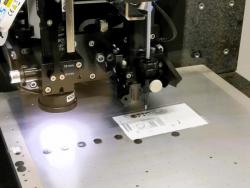Department of Excellence
Research Lines
High Performance Computing –
Big Data – Machine Learning (HPC-BD-ML)
The two objectives that this line of research intends to achieve are:
- developing new skills in the field of High-Performance & Data-Driven Scientific Computing, applied to research in astrophysics, high energy physics and physics of materials;
- training a new generation of computational physicists, able to take up the opportunities and challenges of high performance computing (HPC) in the exascale and post-exascale era, and of new data analysis algorithms based on machine learning (ML ).
Due to the nature of its research lines in fundamental physics, the DF boasts an already consolidated and widely recognized research tradition in the field of HPC and in the analysis of large amounts of data. This requires both the use of the most advanced massively parallel computing infrastructure, and a continuous development of calculation paradigms and codes, that can take full advantage of the continuous evolution of hardware architectures. This development will allow us both to investigate increasingly complex and realistic systems, opening up new horizons and expanding the predictive power of simulations, and to analyze large amounts of data in which physical signals are hidden with greater efficiency and precision.
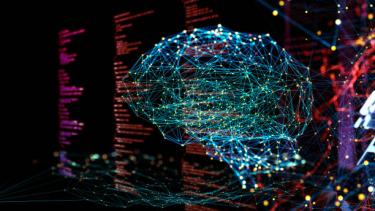 The common factor of these researches is that they are based on theoretical and algorithmic advances and that, due to the exponential increase of both experimental and simulation data, they require massive computational resources, combining HPC, ML techniques, and visualization, query and management of large databases. With this project we intend to deepen and expand the already existing skills for a methodological innovation at the level of algorithms and for a co-design between hardware and software, in order to optimize the performance on constantly evolving computing infrastructures. This development will allow us both to investigate increasingly complex and realistic systems, opening up new horizons and expanding the predictive power of simulations, and to analyze large amounts of data in which physical signals are hidden with greater efficiency and precision.
The common factor of these researches is that they are based on theoretical and algorithmic advances and that, due to the exponential increase of both experimental and simulation data, they require massive computational resources, combining HPC, ML techniques, and visualization, query and management of large databases. With this project we intend to deepen and expand the already existing skills for a methodological innovation at the level of algorithms and for a co-design between hardware and software, in order to optimize the performance on constantly evolving computing infrastructures. This development will allow us both to investigate increasingly complex and realistic systems, opening up new horizons and expanding the predictive power of simulations, and to analyze large amounts of data in which physical signals are hidden with greater efficiency and precision.
Interdisciplinary laboratory of Advanced Electronics and Sensors (LEA)
For its experimental physics activities, the DF has a strong tradition of developing detectors and intends to invest a significant part of the funding of the DdE for to strengthen internal skills in the fields of electronics and sensors, the enhancement of high-level experimental research, and the support to advanced teaching in the electronic-instrumental field in the various curricula of the Master's Degree in Physics. This action intends to contribute to permanently raising the Department's profile of excellence by promoting the harmonious development of research in the various fields and by enhancing the training capacity of young researchers.
The design, construction and application of sensors, electronic and optical devices, control electronics and signal reading are fundamental elements of any experimental physics research. The network of specialized laboratories present in Trieste —already used or managed by researchers and professors of the Department in the context of collaborations with institutions such as INFN, CNR-INO, CNR-IOM, Elettra and INAF— is not accessible to the entire departmental community .
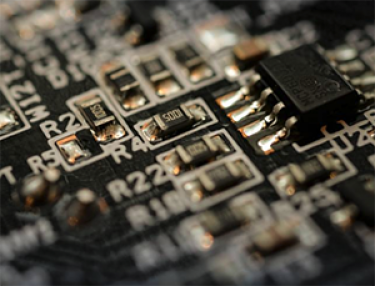 Therefore there is a clear need to create a structure that allows the various groups of the DF, which face similar technological problems in their research and which require instrumentation with compatible characteristics and performance, to access advanced services and equipment with a view to resource optimization. The creation of a natural space for sharing instrumentation, skills and potentially multidisciplinary techniques will generate a virtuous mechanism of cultural exchange and collaboration. Finally, this action has the further objective of integrating the various collaborations with related companies and research institutions in order to maximize synergies with the DF for the development of advanced technology, instrumentation and methodologies.
Therefore there is a clear need to create a structure that allows the various groups of the DF, which face similar technological problems in their research and which require instrumentation with compatible characteristics and performance, to access advanced services and equipment with a view to resource optimization. The creation of a natural space for sharing instrumentation, skills and potentially multidisciplinary techniques will generate a virtuous mechanism of cultural exchange and collaboration. Finally, this action has the further objective of integrating the various collaborations with related companies and research institutions in order to maximize synergies with the DF for the development of advanced technology, instrumentation and methodologies.
Quantum Science and Technology (STQ)
The primary objective of this line is the consolidation and expansion of the theoretical and experimental research activity in the field of quantum science and technology (QST), in which the DF is already a national point of reference, together with the creation of an innovative and synergic didactic offer in this topic.
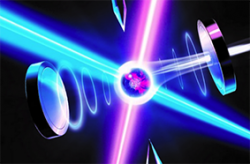 QST research at the DF dates back more than 40 years, with breakthrough results relating to the foundations of quantum mechanics, achieved thanks to the nascent theory of open quantum systems. This activity then expanded over the years and today includes both theoretical and experimental activities, concerning in particular the study of open quantum systems, the various aspects of quantum information and their mathematical foundations, quantum machine learning with its applications to quantum artificial intelligence, quantum many-body physics and quantum simulations with platforms based on ultracold atoms, photonics for quantum optical communications, atom interferometry and quantum sensing with its metrological applications, simulation, growth and characterization of quantum materials, growth of nanoparticles, nanoclusters and quantum dots and characterization of quantum properties.
QST research at the DF dates back more than 40 years, with breakthrough results relating to the foundations of quantum mechanics, achieved thanks to the nascent theory of open quantum systems. This activity then expanded over the years and today includes both theoretical and experimental activities, concerning in particular the study of open quantum systems, the various aspects of quantum information and their mathematical foundations, quantum machine learning with its applications to quantum artificial intelligence, quantum many-body physics and quantum simulations with platforms based on ultracold atoms, photonics for quantum optical communications, atom interferometry and quantum sensing with its metrological applications, simulation, growth and characterization of quantum materials, growth of nanoparticles, nanoclusters and quantum dots and characterization of quantum properties.
The expansion of research activities in QST has the objective of intercepting the most recent experimental and theoretical developments, such as the creation and modelling of photonics, atomic and/or solid-state platforms for quantum information processing, with applications in sensing, communication, computation and simulation, as well as the study and creation of interfaces between distinct quantum platforms – a direction of strong development towards the realization of distributed quantum networks.
Physics of Complex Systems (FSC)
A complex system is a system whose behavior is not easily deducible from the properties of its constituents and from the interactions between them; for example, according to P. W. Anderson "more is different", in the sense that the increase in the number of constituents of a system determines a change in the macroscopic properties that is not only quantitative but also qualitative.
Complex systems range from dynamical systems (systems of non-linear equations) to climate, from astrophysical systems to financial markets, from biophysical systems to social dynamics. Such different complex systems often show similar behaviors, which can be studied and understood with statistical and computational physics methods, as proposed for example by the 2021 Nobel prize winner G. Parisi.
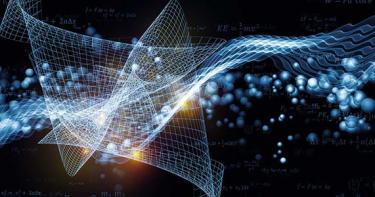 The objective of this line is to create a teaching and research environment to develop innovative techniques and theoretical methodologies for the study, understanding and management of complex behaviors, by optimizing statistical and computational physics approaches. Starting from this core of activities, students can be trained in the most advanced skills and technologies of this area, such as those relating to meteorology, climatology, biophysics, chaotic and turbulent phenomena, neural networks, declination and risk assessment and market dynamics.
The objective of this line is to create a teaching and research environment to develop innovative techniques and theoretical methodologies for the study, understanding and management of complex behaviors, by optimizing statistical and computational physics approaches. Starting from this core of activities, students can be trained in the most advanced skills and technologies of this area, such as those relating to meteorology, climatology, biophysics, chaotic and turbulent phenomena, neural networks, declination and risk assessment and market dynamics.
This line will be in natural synergy with the other research lines of the project and will be supported by an adequate technological infrastructure. In this context, the DdE intends to become a research environment in which physical and computational knowledge applied to complex systems is directed on the one hand to the development of dedicated technologies and on the other to university training, creating a place for real transfer of knowledge from the university to society. The realization of this project sees in the intrinsic interdisciplinarity of its articulations, once inserted in the comprehensive context of applied physics, the key element for successfully tackling the modelling of complex physical systems, with important practical implications.


